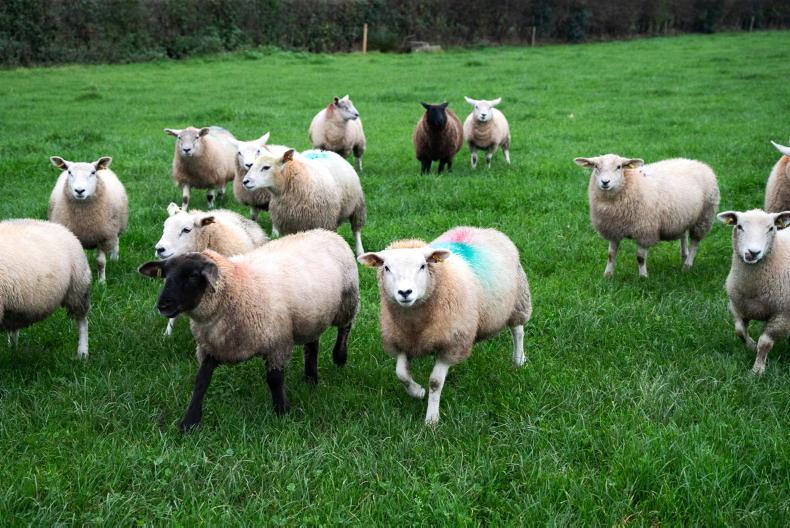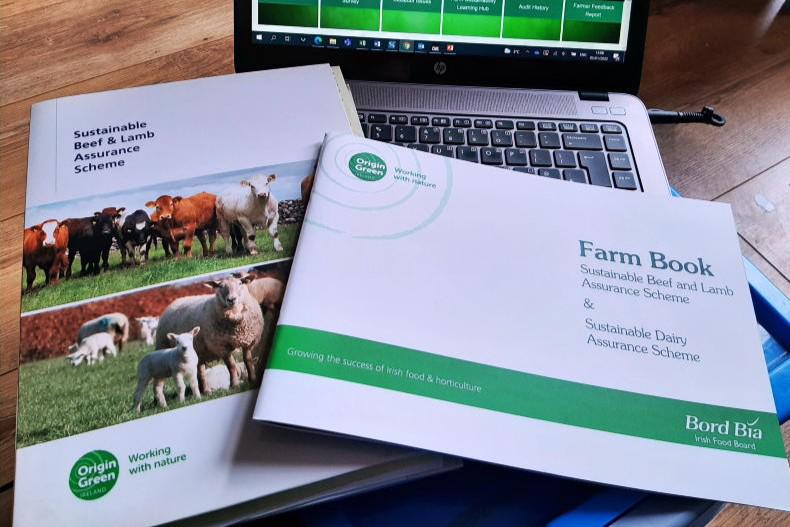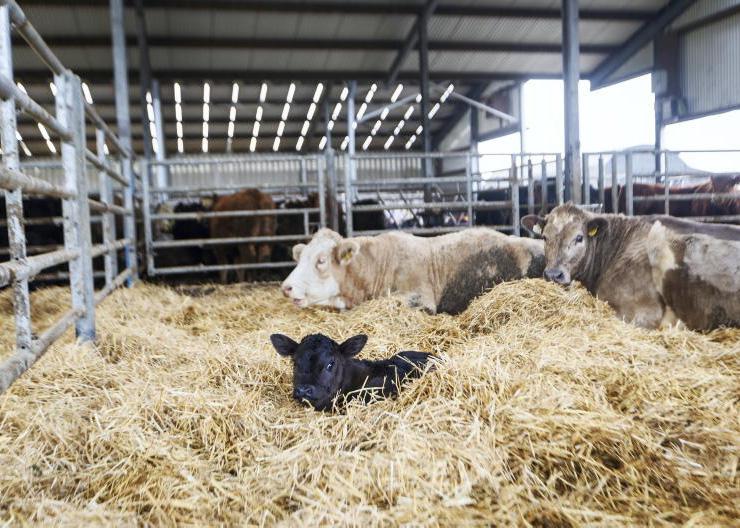The announcement of the Suckler Carbon Efficiency Programme (SCEP) was a major driver in over 9,000 new members joining Bord Bia’s Sustainable Beef and Lamb Assurance Scheme (SBLAS) in 2023.
One of the conditions of the SCEP is that producers must remain a certified member of SBLAS for the five years of the programme.

\ Clive Wasson
In the coming months, the first renewal audits for these new members will begin and this is a step-by-step guide on how to successfully get through the audit.
Set the date
One of the key tasks for any farmer preparing for their renewal audit is to fix a date and time with an auditor as soon as contact is made. This ensures that certification remains active while the renewal process is ongoing.
(Farmers can check when they are due a renewal audit by calling the Helpdesk on 01 5240410 or online at qas.bordbia.ie/livestock/Verify).
High pass rate
Eighty five per cent of farmers successfully pass their Bord Bia audit on the day and go forward for certification. However, if there are problems which are described as “major non-compliances”, identified during the audit, farmers are given up to 28 days to sort these out.
This ‘closeout’ process ensures farmers do not fail the audit if there are any issues identified during the inspection. For example, if an auditor sees and notes an unfenced lagoon, they would request a photograph be sent of the lagoon made safe within the 28-day period.
Closing out the audit
Demonstrating that issues raised in the audit have been sorted out is what is known as the closeout process.

Damien Murray, Origin Green Standards Co-Coordinator Bord Bia.
Where closeout is required, farmers may submit evidence via text, email, or post to the helpdesk, which will assist with the closeout process.
Alternatively, farmers can complete the closeout themselves by logging onto farm.bordbia.ie. Farmers also have the option to nominate a representative, such as a family member or neighbour, to assist them during this process, providing support for those who may require additional help.
Once an audit is conducted, the farmer will remain certified throughout the certification process, including the closeout period, if applicable.
Common issues
In general, the majority of non-compliances found during the audit relate to record-keeping and in particular, recording of animal remedies.
Before your audit, ensure that you have a complete record of all medicines purchased and all medicines administered at least back to the last audit date.
Purchase records can be kept using computer-based records, a manual such as the Bord Bia Farm Book, or by keeping vet prescriptions back to the date of the last audit. The following details must be included:
Date of purchase.Medicine name.Quantity purchased.Name and address of the supplier.For usage you must record:
Date of administration.Name of medicine.Quantity given.Identification of animals.Name of person giving the medicine/remedy or the name of the prescribing vet.Date of the end of the withdrawal period. A common mistake is to insert the number of withdrawal days instead of the date of the end of the withdrawal period.Where a single animal is treated, the identity of the animal must be clearly documented, for example by using the tag number or freeze brand.
Where the remedy is administered to a group of animals, it must be possible to clearly identify each animal in the group from the relevant herd register (eg all calves born 1 January to 31 March only).
Sustainability Survey
A Sustainability Survey also needs to be completed before the audit. The questions cover topics including housing dates and concentrates fed and takes approximately 30 minutes to complete.
The survey can be done online at farm.bordbia.ie. Alternatively, farmers can contact the Helpdesk on 01 524 0410 (Monday to Friday, 9am to 8pm) to complete over the phone.
Online learning
Bord Bia offers free and optional online learning for farmer members through the Farm Sustainability Learning Hub. The modules are designed to support and complement farmers’ existing knowledge. Over 10,300 farmers have registered to use the free modules. Visit farm.bordbia.ie to register. Topics include animal welfare, soil health and water quality, responsible use of antibiotics and farmland biodiversity.
Audit satisfaction
A recent survey conducted with farmers after their audit found:
91% considered the audit process to be straightforward. 97% believed that the audit took a reasonable amount of time.99% found the auditors themselves to be professional.80% found uploading information easy to do.
Post Audit Survey: 3,572 members were surveyed between October 2023 and March 2024.
Bord Bia is developing a new producer standard which will update and replace the existing farm standards. The current beef and lamb standard has not been updated in over seven years.
Many improvements have occurred in Irish agricultural practices in that time which are not reflected in the standard. The update will mean that Bord Bia is able to provide verifiable proof of all existing farm practices when promoting Irish meat and dairy to domestic and international customers.
For Irish farmers to get the best possible prices, it is essential that we continue to credibly market the quality and sustainability credentials of Irish farming at home and abroad. Keeping our standards relevant and reflective of farming practices enables the industry to put its best foot forward.

Bord Bia audits have returned to remote auditing until such time as a new blended auditing system is in place.
The standard is being reviewed and agreed with specially appointed Technical Advisory Committees (TACs), with the aim of reaching agreement on the criteria by the end of this year.
The TAC includes farmer representatives, industry representatives, technical experts and industry regulatory representatives.
The aim is to pilot the draft standard in early 2025 on a selection of farms. The pilot audits will help to ensure that the audit is fit for purpose and practical for farmers.
Bord Bia will provide full details of the new requirements to all farmer members to give sufficient notice before any farmer is audited under the new standard.
The announcement of the Suckler Carbon Efficiency Programme (SCEP) was a major driver in over 9,000 new members joining Bord Bia’s Sustainable Beef and Lamb Assurance Scheme (SBLAS) in 2023.
One of the conditions of the SCEP is that producers must remain a certified member of SBLAS for the five years of the programme.

\ Clive Wasson
In the coming months, the first renewal audits for these new members will begin and this is a step-by-step guide on how to successfully get through the audit.
Set the date
One of the key tasks for any farmer preparing for their renewal audit is to fix a date and time with an auditor as soon as contact is made. This ensures that certification remains active while the renewal process is ongoing.
(Farmers can check when they are due a renewal audit by calling the Helpdesk on 01 5240410 or online at qas.bordbia.ie/livestock/Verify).
High pass rate
Eighty five per cent of farmers successfully pass their Bord Bia audit on the day and go forward for certification. However, if there are problems which are described as “major non-compliances”, identified during the audit, farmers are given up to 28 days to sort these out.
This ‘closeout’ process ensures farmers do not fail the audit if there are any issues identified during the inspection. For example, if an auditor sees and notes an unfenced lagoon, they would request a photograph be sent of the lagoon made safe within the 28-day period.
Closing out the audit
Demonstrating that issues raised in the audit have been sorted out is what is known as the closeout process.

Damien Murray, Origin Green Standards Co-Coordinator Bord Bia.
Where closeout is required, farmers may submit evidence via text, email, or post to the helpdesk, which will assist with the closeout process.
Alternatively, farmers can complete the closeout themselves by logging onto farm.bordbia.ie. Farmers also have the option to nominate a representative, such as a family member or neighbour, to assist them during this process, providing support for those who may require additional help.
Once an audit is conducted, the farmer will remain certified throughout the certification process, including the closeout period, if applicable.
Common issues
In general, the majority of non-compliances found during the audit relate to record-keeping and in particular, recording of animal remedies.
Before your audit, ensure that you have a complete record of all medicines purchased and all medicines administered at least back to the last audit date.
Purchase records can be kept using computer-based records, a manual such as the Bord Bia Farm Book, or by keeping vet prescriptions back to the date of the last audit. The following details must be included:
Date of purchase.Medicine name.Quantity purchased.Name and address of the supplier.For usage you must record:
Date of administration.Name of medicine.Quantity given.Identification of animals.Name of person giving the medicine/remedy or the name of the prescribing vet.Date of the end of the withdrawal period. A common mistake is to insert the number of withdrawal days instead of the date of the end of the withdrawal period.Where a single animal is treated, the identity of the animal must be clearly documented, for example by using the tag number or freeze brand.
Where the remedy is administered to a group of animals, it must be possible to clearly identify each animal in the group from the relevant herd register (eg all calves born 1 January to 31 March only).
Sustainability Survey
A Sustainability Survey also needs to be completed before the audit. The questions cover topics including housing dates and concentrates fed and takes approximately 30 minutes to complete.
The survey can be done online at farm.bordbia.ie. Alternatively, farmers can contact the Helpdesk on 01 524 0410 (Monday to Friday, 9am to 8pm) to complete over the phone.
Online learning
Bord Bia offers free and optional online learning for farmer members through the Farm Sustainability Learning Hub. The modules are designed to support and complement farmers’ existing knowledge. Over 10,300 farmers have registered to use the free modules. Visit farm.bordbia.ie to register. Topics include animal welfare, soil health and water quality, responsible use of antibiotics and farmland biodiversity.
Audit satisfaction
A recent survey conducted with farmers after their audit found:
91% considered the audit process to be straightforward. 97% believed that the audit took a reasonable amount of time.99% found the auditors themselves to be professional.80% found uploading information easy to do.
Post Audit Survey: 3,572 members were surveyed between October 2023 and March 2024.
Bord Bia is developing a new producer standard which will update and replace the existing farm standards. The current beef and lamb standard has not been updated in over seven years.
Many improvements have occurred in Irish agricultural practices in that time which are not reflected in the standard. The update will mean that Bord Bia is able to provide verifiable proof of all existing farm practices when promoting Irish meat and dairy to domestic and international customers.
For Irish farmers to get the best possible prices, it is essential that we continue to credibly market the quality and sustainability credentials of Irish farming at home and abroad. Keeping our standards relevant and reflective of farming practices enables the industry to put its best foot forward.

Bord Bia audits have returned to remote auditing until such time as a new blended auditing system is in place.
The standard is being reviewed and agreed with specially appointed Technical Advisory Committees (TACs), with the aim of reaching agreement on the criteria by the end of this year.
The TAC includes farmer representatives, industry representatives, technical experts and industry regulatory representatives.
The aim is to pilot the draft standard in early 2025 on a selection of farms. The pilot audits will help to ensure that the audit is fit for purpose and practical for farmers.
Bord Bia will provide full details of the new requirements to all farmer members to give sufficient notice before any farmer is audited under the new standard.












SHARING OPTIONS